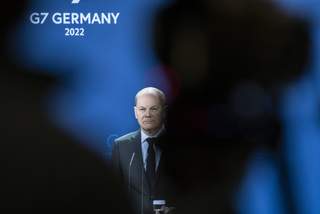
Chancellor Olaf Scholz © IMAGO/Chris Emil Janßen
The Group of 7: World Economic Summit and Community of Values
The end of the Second World War marked the beginning of a new phase of globalization, one manifestation of which was the rapid expansion of trade and financial flows. At the same time, globalization also meant that a country’s prosperity could no longer be governed at the national level alone. The collapse of the Bretton Woods system of fixed exchange rates in the early 1970s was a painful reminder of this. That arrangement had formed one of the central pillars of global financial stability and growing international trade for almost three decades. The oil shocks of the 1970s led to a severe global economic slump.
The Origins of Global Governance
To tackle these challenges, the heads of state and government of the six leading industrial nations – France, Germany, Italy, Japan, the United Kingdom, the United States – met for the first world economic summit in 1975 on the initiative of Helmut Schmidt and Valéry Giscard d’Estaing. Canada joined in 1976 to form the Group of 7 (G7). Since then, a summit has been held at least once every year under a rotating presidency.
Coordination between the group’s members contributed to successful crisis resolution in the 1970s. In the following years, it played a central role in developing the global financial architecture and effectively coordinating the national economic policies of its members. Examples include the Louvre Agreement of 1987 to reduce global imbalances and the establishment of the Financial Stability Forum in 1999 (since the 2009 Financial Stability Board) to promote uniform financial market regulation.
In 1998, Russia joined the group to create the G8. Russia’s membership was suspended in 2014 after its illegal annexation of Crimea.
The Functioning and Organization of the G7
The G7 is an informal forum to coordinate national policies and joint action. Because it is not an international organization with an administrative apparatus of its own, the agenda is, in large parts, determined by the respective presidency. In addition to the annual summit, ministerial meetings occur several times per year. The German G7 presidency in 2015 held meetings of the foreign, finance, energy, science and health ministers. This demonstrates the sheer breadth of issues coordinated within the G7.
Today, the G7 addresses almost all important global questions. At their 2015 summit in Elmau, Germany, the group adopted decisions not only on financial and economic issues, but additionally on questions of foreign and security policy, development, health, climate protection and marine conservation.
Germany took over the G7 presidency for the second time in January 2022. This year’s summit will take place in June with a focus on “progress towards an equitable world.”
The Future of the G7
The rise of the emerging economies and developing countries since the 1990s has significantly shifted the center of gravity of the global economy leading to the founding of the G20. This forum includes the most important emerging economies and other industrialized countries, in addition to the G7 states. However, the G7 retains decisive qualities that continue to make it an important forum of global governance.
While the relative global weight of the G7 economies has declined, they still represent a solid 46 percent of global GDP and approximately 47 percent of world merchandise exports and 52 percent of world merchandise imports. Accordingly, the group remains influential in setting the political framework for the global economy. Moreover, the G7 is a community of shared values, standing for democracy, rule of law, respect for human rights, and the free market.
G7 Dialogue with Civil Society
Under the German presidency in 2007, the G8 initiated an outreach process to promote exchange between the G8 and civil society. In this framework, the German government met with representatives of academia, business, trade unions, NGOs, and youth organizations from the G8 states. Since then, the dialogue with civil society has been a firm fixture in the G8/G7 process, conducted each year by the respective G8/G7 presidency.
In order to coordinate the positioning of business in this outreach process, the G8 Business Summit (B8) was created in 2007 on the initiative of BDI. Since Russia’s exclusion from the G8 in 2014, the business outreach likewise functions as the B7.



